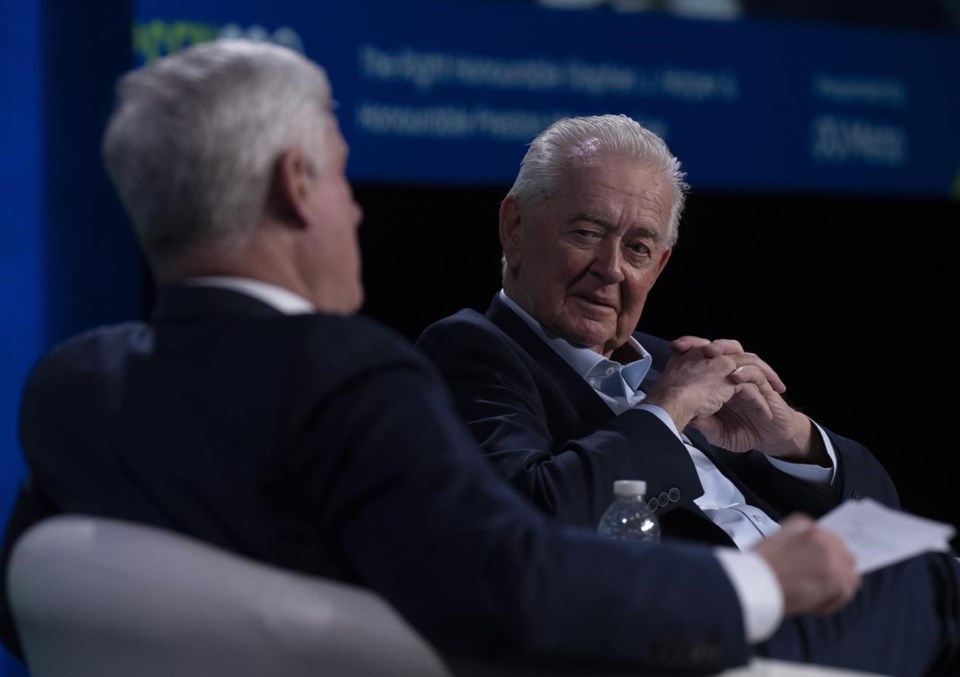EDMONTON — A panel reviewing Alberta’s COVID-19 response is calling for rule changes to ensure the premier and cabinet have the last word in future crises, with help from a new senior science officer.
Former Reform Party leader Preston Manning, who chaired the panel, says the senior science officer could create a roster of experts from medicine, social sciences, psychology and law to advise on decisions and their potential effects.
"You're bringing all the health science together on this," Manning said in an interview before the release of the panel's report Wednesday.
“If the response measures include effects on the economy, effects on the social life in the community, educational effects (and) effects on rights and freedoms in the courts, you need a multidisciplinary science pool — not just one focused in the area where the emergency began,” said Manning.
The report by the Public Health Emergencies Governance Review Panel puts forward more than 90 recommendations on how Alberta can better prepare rules, regulations and its organizational structure to deal not just with future pandemics, but any emergency.
The core recommendation is that all provincewide emergencies are to be directed by cabinet and implemented through Alberta’s lead disaster response co-ordinator, the Alberta Emergency Management Agency.
In future pandemics or health crises, Alberta Health Services would be called on to make recommendations related strictly to health matters, but all decisions would be made by government through AEMA.
The report urges the government to spell that out in new legislation.
“Political people have to be responsible for the overall direction and management, because they're the people that the public can hold accountable,” said Manning.
The office of Premier Danielle Smith said she has received the panel’s report, but no decisions have been made in response to the recommendations.
“Together with our caucus, we will review and analyze the report and consider the panel’s recommendations as we prepare for future legislative sessions," her office said in an email Wednesday.
In July, a Court of King’s Bench judge determined the province ran afoul of its Public Health Act when then-chief medical officer of health Deena Hinshaw improperly deferred some of her public health COVID-19 decision-making authority to cabinet.
Justice Minister Mickey Amery introduced a bill earlier this month to explicitly grant that authority to cabinet.
Manning’s panel recommendations focus on amending rules to better organize decision-making in a crisis.
It urges reforms and changes to Alberta’s Bill of Rights, along with other laws, to ensure personal freedoms are better protected in a crisis.
If liberties must be curtailed, it calls for mandated cost-reasonable fast-tracked court challenges.
It urges government work with health regulatory bodies to ensure medical professionals are not unreasonably curtailed from speaking their minds should they disagree with government or regulatory policy in a health crisis.
It calls for more transparency in government decisions, along with mandated reviews.
The report also urges changes to the Employment Standards Code to provide for leaves of absence for non-compliant employees during a public health emergency.
It calls on the province to close schools only as an absolute last-ditch resort in a health emergency, given the domino effects on families and on students’ social development and learning.
Manning’s recommendation for a new science panel echoes a promise Smith made on her first day as premier in October 2022.
At that time Smith announced Hinshaw would be replaced, and that Smith would instead draw on the advice from a new hand-picked team of science advisers.
She said she was keen to hear from Paul Alexander, an adviser to former U.S. president Donald Trump. Alexander dismissed COVID-19 vaccines as “bioweapons” and urged using herd immunity to combat the pandemic.
Smith launched the Manning review in January at a cost of $2 million.
Manning, like Smith, has publicly questioned the COVID-19 restrictions. He has said the rules affected the long-term mental and physical health of Canadians while eroding their Charter rights.
Smith has questioned the mainstream science approach to the pandemic.
She previously endorsed debunked treatments, such as ivermectin and hydroxychloroquine, and embraced fringe views of the pandemic such as the Great Barrington Declaration, which called for protecting the elderly and frail but otherwise letting COVID-19 run free to build up herd immunity.
This report by The Canadian Press was first published Nov. 15, 2023
— With files from Bill Graveland in Calgary
Dean Bennett, The Canadian Press




